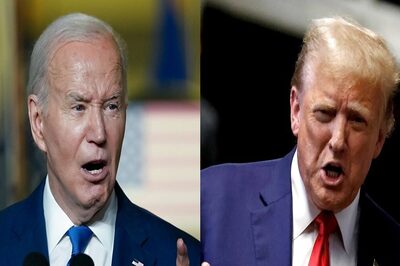
views
Pakistan has an unending list of national concerns, such as mounting debt, religious fundamentalism, poor education and health facilities, and rising unemployment. It is also a rogue nation with a notorious history of sheltering and encouraging terrorism. While many Pakistanis are struggling to buy ‘aata’ (wheat flour) and pay their monthly electricity bills, social media repeatedly reveals their obsession with India. Is that predictable? It is, but the extent to which that is true is not.
Several Pakistani YouTube channels compare India, a modern-day powerhouse, with a tottering, blundering Pakistan, making one wonder how that is relevant. The topics are as diverse as cricket, the availability of bikes and cars in both nations, and education, of course. Some disillusioned Pakistanis, who acknowledge India’s phenomenal growth as an economic power with considerable global influence, do not hesitate to admit that their own nation has gone to the dogs.
As one such Pakistani told Sohaib Chaudhry’s Real Entertainment TV, a YouTube channel, “Even if India goes to the moon before us” (which it has) “or becomes the number one super country in the world” (it will), “we will go to heaven.” It is a scathing comment on Pakistan’s dismal state of affairs, while India makes continuous progress under the leadership of Prime Minister Narendra Modi.
Both nations love their cricket, but it is astonishing to see how closely the average Pakistani watches the Men in Blue’s matches even when they do not play their national team. After India thrashed Pakistan at the Asia Cup recently, the Men in Green’s skipper Babar Azam was severely criticised for his questionable leadership skills on mainstream and social media. And, strangely, Azam’s batting skills and performances are often compared to Virat Kohli’s, although an Indian who does the exact opposite will be difficult to find.
Some Pakistanis were sporting enough to applaud the Indian team after its Asia Cup triumph and 2-1 series win against Australia. However, Hassan Zulfiqar’s Vlogs on YouTube were among those who concluded that the Asia Cup final between India and Sri Lanka had been fixed. Loosely translated, he said: “Sri Lanka’s economy and the country itself are in a bad shape. India has a lot of money and BCCI, too. So there might have been a commitment that money will be paid (by the BCCI) and Sri Lanka will lose.” So what if what he said was laughably absurd? Pakistan had smarting others who shared this point of view.
Chandrayaan-3’s successful lunar exploration mission turned the Indian Space Research Organisation’s (ISRO) glorious achievement into a hot topic of discussion. While talking to Pakistani YouTubers after India’s triumph in space, some citizens said unhesitatingly that thinking about similar achievements made little sense when day-to-day life in Pakistan was a struggle for the commoner. One of them told Shaila Khan on Naila Pakistani Reaction, a YouTube channel, that India had gone to the moon after two failed attempts because practice made a man perfect. As far as Pakistan was concerned, he added, “…humne toh beda hi gark kar diya mulk ka.” Loosely translated, that means: “We have destroyed our nation.”
Hilarious reactions were in plenty, too. In a video of Sana Amjad, a YouTuber, one person congratulated India but added that the lunar mission was a ‘marketing stunt’. Another affirmed that Pakistan’s missile technology was at par with the United States and better than India. Hence, Pakistan should have gone to the moon before India! A third person, a Management Sciences teacher, seemed practically sure that India’s successful lunar mission was ‘fake news’ — just like “America’s fake claims” of going to the moon in the last century. He concluded uneasily by saying that if India had reached the moon, it was good news for the world and humanity. However, India should not say that technology, knowledge, and education helped it reach there. It was possible because Allah allowed India to go there, he said. This writer must add that this is a Management Sciences teacher’s point of view.
In Real Entertainment TV, a YouTube channel, another person said that the news of Chandrayaan-3 had been manufactured by social media. “You have not seen it, have you,” he asked, adding, “It is not realistic news.” Such ridiculous points of view and aggressive criticism of YouTubers who speak of India highly notwithstanding, Pakistan does have a significant percentage of people who resent their country. They complain about poverty, corrupt politicians, high taxes and unmanageable cost of living. In social media interviews, deviations from the original question about Chandrayaan-3’s success, for instance, are predictable. They reveal the average Pakistani’s inability to talk about the nation’s modern-day positives, which are non-existent, because of which all things Indian keep them interested in their powerful, influential and rapidly growing neighbour.
Many college students in Pakistan use Indian educational videos on YouTube to teach themselves because their own education system is woefully inadequate. A comparison of videos of schoolchildren in both nations on Pakistani Real Reactions, a YouTube channel, tells a shocking inside story. Looking at a picture, a seventh-standard student of a Pakistani government school mistook a volcanic eruption for a bomb blast while another said it was a fire! A sixth-standard student confused ‘t’ for ‘m’ while trying to read ‘cat’ written on the blackboard. Younger Indian students in a spoken English class are far more impressive, a second video shows. Embarrassing facts like these tumble out of the cupboard on social media from time to time.
Pakistan does not have a report card it can be proud of. Its obsession with India can be understood, though. India has become a global power with a robust economy and a distinct voice. Pakistan is stuck deep inside a quagmire of stagnation. The two countries have a shared history. As the gap between the two nations increases with each passing day, many Pakistanis end up staring at their neighbour — with Kashmir as opposed to education in their minds.
The author, a journalist for three decades, writes on literature and pop culture. Among his books are ‘MSD: The Man, The Leader’, the bestselling biography of former Indian captain MS Dhoni, and the ‘Hall of Fame’ series of film star biographies. Views expressed in the above piece are personal and solely that of the author. They do not necessarily reflect News18’s views.













Comments
0 comment